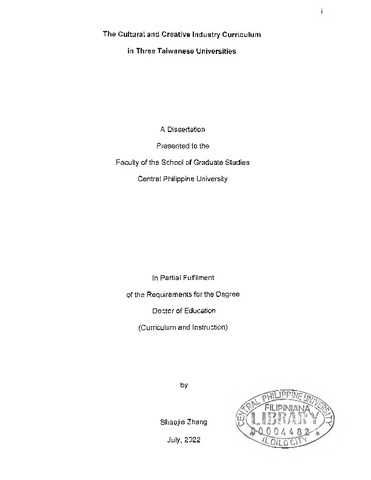The cultural and creative industry curriculum in three Taiwanese universities
| dc.contributor.adviser | Cocjin, Annalee L. | |
| dc.contributor.author | Zhang, Shaojie | |
| dc.date.accessioned | 2022-11-11T06:02:41Z | |
| dc.date.available | 2022-11-11T06:02:41Z | |
| dc.date.issued | 2022 | |
| dc.identifier.citation | Zhang, S. (2022). The cultural and creative industry curriculum in three Taiwanese universities (Unpublished Doctoral dissertation). Central Philippine University, Jaro, Iloilo City. | en_US |
| dc.identifier.uri | https://hdl.handle.net/20.500.12852/2380 | |
| dc.description | Abstract only | en_US |
| dc.description.abstract | The study examined the cultural and creative industries in three Taiwanese universities. In particular, this examined the core components and future directions of the Culture and Creativity curricula in three Taiwanese universities, identified their challenges and potential growth, revealed their best practices, and improved the curriculum of Chinese culture and creative industry in light of the findings. Each of the three institutions has a special culture and curriculum when it comes to the objectives, execution, and evaluation of the culture and creative curricula. Their educational practice benefits from effective management and marketing initiatives that place a high priority on student marketing and training design. These are their strong areas because they give students first-hand knowledge of the sector. In Taiwan, there is a thriving art scene as well. According to the findings, institutions are excellent at managing their physical spaces and employing small-group instruction to familiarize students with marketing and design operations management. All institutions will have greater global direction if they concentrate on cross-border production collaboration. In order to satisfy the requirements of different majors and courses, it is advised that teachers of cultural and creative courses possess adaptable qualifications. They should also regularly evaluate and enhance their curricula for the cultural and creative sectors. Additionally, by offering structured, cross-disciplinary, and integrated courses, students can learn in an orderly and thorough manner. As a result, curriculum creation demands practical adjustments to the societal pulse and student exit strategies. Parents and students increasingly place a high focus on employability; thus, curriculum planning must be realistic and take the social climate and students' flexibility into account in order to avoid developing skills while meeting social demands. | en_US |
| dc.format.extent | viii, 143 leaves | en_US |
| dc.language.iso | en | en_US |
| dc.subject.ddc | GSL Theses 378.242 Z612 | en_US |
| dc.subject.lcsh | Universities and colleges | en_US |
| dc.subject.lcsh | Curriculum planning | en_US |
| dc.subject.lcsh | Education--Curricula | en_US |
| dc.subject.lcsh | Taiwan | en_US |
| dc.subject.lcsh | Culture--Study and teaching (Higher) | en_US |
| dc.subject.lcsh | Creative ability--Study and teaching | en_US |
| dc.title | The cultural and creative industry curriculum in three Taiwanese universities | en_US |
| dc.type | Dissertation | en_US |
| dcterms.accessRights | Not publicly accessible | en_US |
| dc.description.bibliographicalreferences | Includes bibliographical references | en_US |
| dc.contributor.chair | Junsay, Merle | |
| dc.contributor.committeemember | Pet, Arlene D. | |
| dc.contributor.committeemember | Valaquio, Belinda R. | |
| dc.contributor.committeemember | Causing, Frisian Y. | |
| dc.contributor.department | School of Graduate Studies | en_US |
| dc.description.degree | Doctor of Education (Curriculum and Instruction) | en_US |


